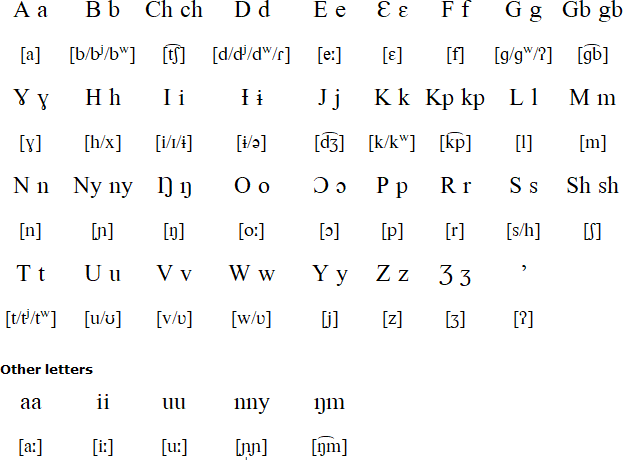Dagbani is member of the Gur branch of Niger-Congo languages. It is spoken mainly in northern Ghana by about 1.1 million people, particularly in the Kingdom of Dagbon in the Northern, Upper West, Upper East, Savannah and North East regions. It is closely related to, and mutually intelligible with, Mossi, which is spoken mainly in Burkina-Faso. Dagbani is also known as Dagbamba, Dagbane or Dagbanle, and is spoken by people who call themselves Dagomba or Dagbamba.
Dagbani is taught in primary and secondary schools, and there are radio programmes in the language.

Hear the Dagbani alphabet (Dagban bachi):
Download an alphabet chart for Dagbani (Excel)
Details of the Archi alphabet provided by Wolfram Siegel
Sal' la sala. Bɛhig' be sokam sanimi, din pa la amii. Suhizɔbo be sokam sani; ka nambɔxu beni. Suhubɔhibo mi bi lan kɔŋ yigunaadam kam sani. Dinzuxu dimbɔŋɔ zaa wuhiya ka dama di tu kamaata ka ti zaa yu tab' hali ni ti puuni.
All human beings are born free and equal in dignity and rights. They are endowed with reason and conscience and should act towards one another in a spirit of brotherhood.
(Article 1 of the Universal Declaration of Human Rights)
Information about Dagbani | Numbers
Information about the Dagbani language and people
http://en.wikipedia.org/wiki/Dagbani_language
https://www.ethnologue.com/language/dag
https://learndagbani.org/course/learn-dagbani/lessons/whats-the-dagbani-language/
https://yen.com.gh/133473-dagbani-basic-phrases-interesting-facts.html
Dagbani dictionaries
http://glosbe.com/en/dag/
http://www.rogerblench.info/Language/Niger-Congo/Gur/Dagbani%20dictionary%20CD.pdf
Berba, Birifor (Northern), Birifor (Southern), Dagaare, Dagbani, Frafra, Gourmanchéma, Hanga, Kabiye, Kasem, Konkomba, Kulango, Kusaal, Láá Láá Bwamu, Mampruli, Mbelime, Moba, Mossi, Nateni, Ngangam, Ntcham, Paasaal, Safaliba, Sisaali, Tammari, Tem, Tumulung Sisaala, Turka, Waama, Western Sisaala
Languages written with the Latin alphabet
Page last modified: 23.01.23
[top]
You can support this site by Buying Me A Coffee, and if you like what you see on this page, you can use the buttons below to share it with people you know.

If you like this site and find it useful, you can support it by making a donation via PayPal or Patreon, or by contributing in other ways. Omniglot is how I make my living.
Note: all links on this site to Amazon.com, Amazon.co.uk
and Amazon.fr
are affiliate links. This means I earn a commission if you click on any of them and buy something. So by clicking on these links you can help to support this site.
[top]